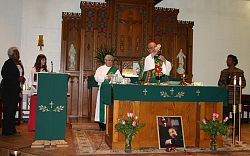Black Catholics of Utah celebrate Martin L. King

SALT LAKE CITY — "Dr. Martin Luther King, Jr.’s words are as profound today as they were when he spoke them some 50 years ago," said Father Michael Sciumbato, pastor of Our Lady of Guadalupe Parish. Fr. Sciumbato celebrated the Mass commemorating the life and message of Dr. Martin Luther King, for the Black Catholics of Utah who annually honor Dr. King on his birthday. The celebration was held at Our Lady of Guadalupe Parish Jan. 24. "I have to tell you that ever since I was a seminarian, 25 years ago, I often dreamed of celebrating Mass and giving a homily ian honor of Dr. King," said Fr. Sciumbato. "When I was in seminary I was on the Social Justice Committee and every year we would plan a week of celebration in honor of Dr. King. "The Archdiocese of Portland always hosted a huge Mass in honor of Dr. King, and I often wondered what I would say in our day and age about his message," said Fr. Sciumbato. "After thinking long and hard, I came to the conclusion that I am completely inadequate for that task. The best person to tell you about Dr. King is Martin himself. So I thought we could spend a little time reflecting on his writings. "Martin Luther King, Jr. was born Jan. 15, 1929, in Atlanta, Ga. His father was a minister and his mother was a school teacher," said Fr. Sciumbato. "Even though he came from a high (economic) background, he experienced racism at a very early age." Fr. Sciumbato said in Dr. King’s first book, "Strive for Freedom," he describes the first time he experienced the indignity of racial discrimination. It happened with his father in a shoe store. The clerk said he would wait on them if they went to the back of the store. Dr. King’s father refused, and left the store saying, "I don’t care how long I have to live with this system, I will never accept it." Dr. King came to national attention in December 1955, as one of the leaders of the Montgomery, Ala., bus boycott prompted by the arrest of Rosa Parks, who refused to give up her seat in favor of a white passenger. Fr. Sciumbato said Dr. King recognized a boycott was an unethical and un-Christian method. A boycott suggested an economic squeeze which lead one bogged down in a negative. Dr. King wrote: "Our concern was not to put the bus company out of business, but to put justice in business. He who accepts evil without protesting against it, is really cooperating with it. When oppressed people willing accept their oppression, they only serve to give the oppressor a convenient justification for his acts…So in order to be true to one’s conscience, and true to God, a righteous man has no alternative but to refuse to cooperate with the evil system. This I felt was the nature of our actions. From that moment on, I was complete in my thought, our movement was an act of massive noncooperation. From then on I rarely used the word boycott." Fr. Sciumbato said, "In 1963, Dr. King was arrested in Birmingham, Ala., as one of the leaders of a demonstration against racially segregated public facilities. In jail Dr. King wrote the ‘Letter from Birmingham City Jail.’ It was written on scraps of toilet paper and in the margins of newspapers because he was not allowed paper during his incarceration. The letter eloquently expressed the frustration and rage of oppressed peoples of all times and places. "For years now I have heard the word wait," wrote Dr. King. "It rings in the ear of every Negro with a piercing familiarity. This wait almost always meant never. We have waited for more than 340 years for our Constitutional and God-given rights. I guess it is easy for those who have never felt the stinging darts of segregation to say wait." Fr. Sciumbato said in 1964, Martin Luther King became the youngest person ever to receive the Nobel Prize for Peace. His acceptance speech revealed his great sense of hope for the future of America and for all humankind. Dr. King accepted the Nobel Prize saying he had faith in America and faith in the future of mankind. He believed there was still hope in a brighter tomorrow. Fr. Sciumbato quoted Dr. King saying, "I have the audacity to believe that people everywhere can have three meals a day for their bodies, education, and culture for their minds, and dignity, equality, and freedom for their spirits. I believe that what self-centered men have torn down, men other-centered can build up. I too believe that one day mankind will bow before the altars of God and be found triumphant over war and bloodshed, and non-violent redundant good will reclaim the rule of the land…I still believe that we shall overcome." Dr. King was murdered in Memphis, Tenn., April 4, 1968. The whole world mourned his death. On the eve of his death, Fr. Sciumbato said Dr. King delivered his last and most apocalyptic sermon. In Dr. King’s final speech he said, "We, as a people will get to the promised land. I am happy tonight. I am not worried about anything. I am not fearing any man. Mine eyes have seen the glory of the coming of the Lord."
© Copyright 2024 The Diocese of Salt Lake City. All rights reserved.

Stay Connected With Us